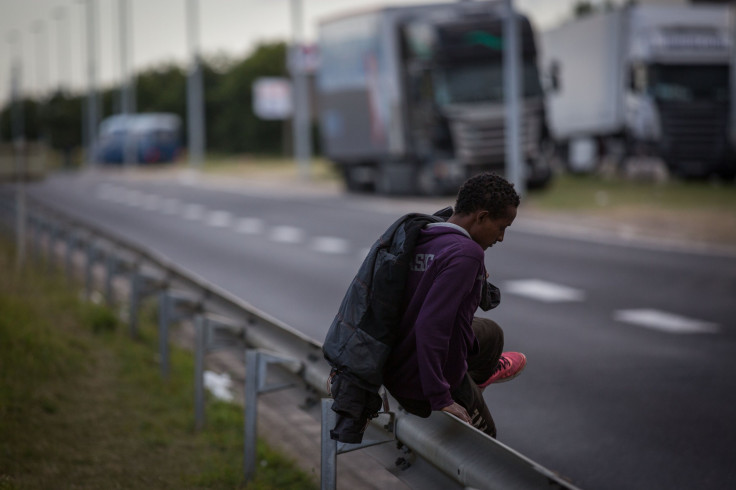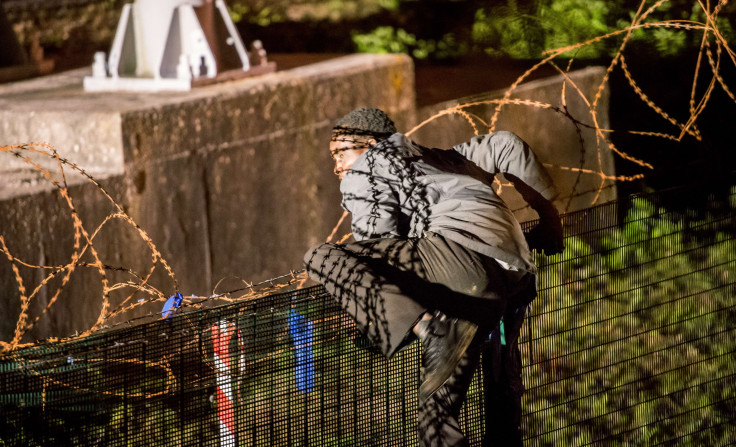Calais Migrant Crisis: British Politicians Talk Tough, But Refugees Determined To Get To UK At Any Cost

After thousands of migrants made repeated attempts to storm the Channel Tunnel that connects the French port of Calais with Britain this week, politicians and newspapers in the country have begun talking tough. Whether British authorities can match the determination of migrants, many of whom have endured dangerous, months-long journeys in their quest to reach England, however, remains uncertain
Over 3,500 attempts have been made by migrants, many of whom are from countries in Africa, the Middle East and central Asia, to enter the tunnel this week. The deployment of French riot police, armed with pepper spray, dogs and batons, has not succeeded in stopping the attempts, though on Wednesday, the latest day for which data is available, only 300 people were reported to have tried to access the tunnel, down from 1,500 each of the previous two nights.
A Sudanese man died on Wednesday, after being hit by a truck that transports vehicles through the tunnel, French police said, according to Reuters. French media said he was the ninth migrant to be killed in the crisis since early June.
Prime Minister David Cameron warned migrants Thursday that the U.K. was “no safe haven,” for them, adding that illegal immigrants would be removed from the country. Earlier in the week, he described the thousands of migrants gathered in Calais as a “swarm,” prompting angry condemnation from rights groups and opposition politicians.
In addition Lord Dannatt, a former head of the British Army, said troops could help set up detention camps if necessary to hold migrants who had illegally made it through the Channel Tunnel, the Telegraph reported.
Peter Sutherland, the U.N.'s special representative on international migration, accused the U.K. of a "xenophobic response," to the crisis, adding that any country that thought it could stop the "alleged floods" of people with fences was "living in cloud cuckoo land," ITV reported.

The impact of the crisis on some parts of southern England has been considerable. Social services in Kent, the county where the tunnel exits in Dover, have reported being under “enormous strain,” as they attempt to cope with an influx of unaccompanied children seeking asylum in the U.K., the Guardian reported. Kent County Council said it is currently caring for 605 unaccompanied asylum-seeking children.
In addition, the disruption to channel crossings caused by a combination of the migrant crisis and striking French workers has prompted British police to launch “Operation Stack” -- a procedure to cope with vehicles lining up to get into the tunnel which turns a major highway into a car park. This has resulted in some local disquiet and severe traffic disruption.
On the other side of the equation, however, are migrants often fleeing war in countries like Syria or Iraq, who feel they have no other choice but to press ahead with their attempts to get to England, whatever the cost.
Migrants living in French refugee camps in Calais told the New York Times of the hardship they endured to get to there, and of their determination to continue. Mima, 26, a university graduate from Ethiopia, told the paper he fled political persecution in his homeland, and crossed Sudan, Libya and the Mediterranean to Italy. Half of the 243 people on the rickety boat he journeyed on died during the crossing to Europe, he said.
Another migrant, Akbrat, a 23-year-old Eritrean woman, told the paper of her harrowing Mediterranean crossing, saying: “I thought I would die on that boat. Until I die, I will try to go to England.”
© Copyright IBTimes 2025. All rights reserved.






















